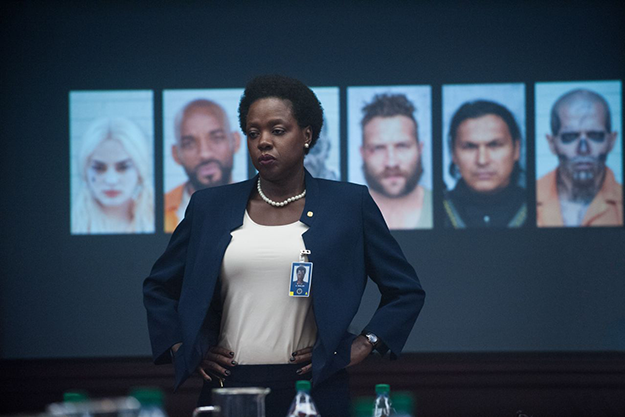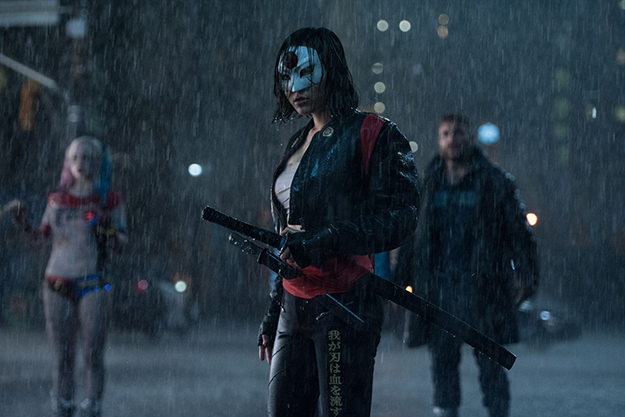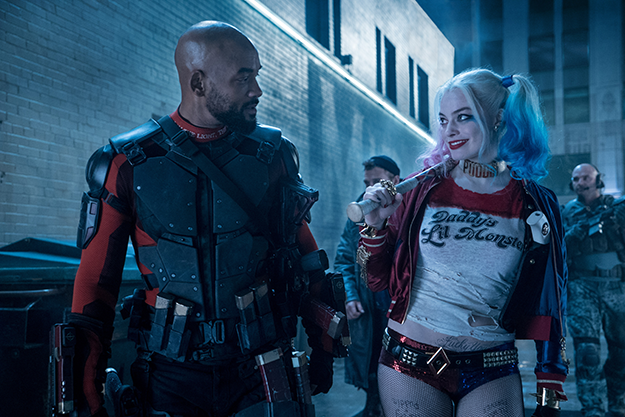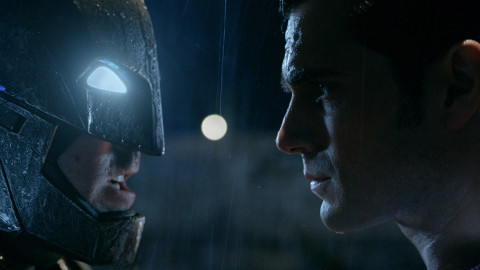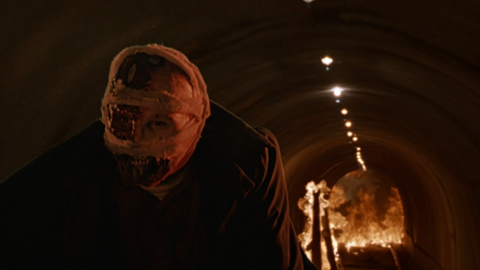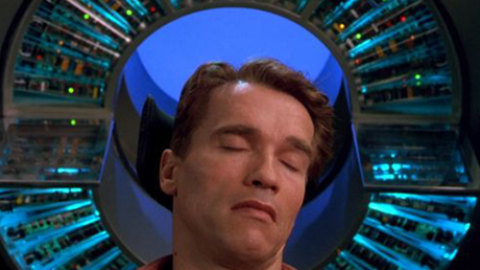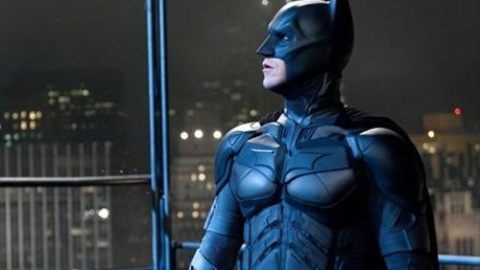Deep Focus: Suicide Squad
David Ayer’s Suicide Squad fritters away the piquant notion of taking a men-on-a-mission movie and peopling it with super anti-heroes. In this Dirty Half-Dozen movie based on various incarnations of the DC Comics series of the same name, Joel Kinnaman plays a righteous Navy SEALs colonel, Rick Flagg, charged by badass U.S. intelligence chief Amanda Waller (Viola Davis) with turning maladjusted freaks of nature and America’s Most Wanted costumed criminals into a fighting unit. As part of (God help us) Warner Brothers’ developing DC Universe, they occupy a world in which Ben Affleck’s stubble appears as Batman, and everyone thinks Superman is dead. (Unlike moviegoers, the denizens of this world didn’t get to see the earth tremble atop Supes’s coffin at the end of Batman v. Superman: Dawn of Justice, suggesting that he will rise again.) With Superman gone, Waller regards this team as America’s best answer to existential threats from the heavens and hells of forgotten gods or from gaudily garbed aliens or “metahumans” (DC talk for “mutants”). Ayer celebrates assassins who never miss a kill shot, but his film keeps missing the target as a tall tale or a sprawling spectacle.
The movie’s pace and feel are relentlessly punchy: if the mayhem doesn’t pound audiences into the back of their seats, the sound track will. As a storyteller, Ayer spins his wheels when he isn’t spinning a turntable stacked with baby-boomers’ greatest hits, ranging from “Sympathy for the Devil” to “Fortunate Son.” It’s fun to hear “House of the Rising Sun” while Ayer’s camera moves into Belle Reve Federal Penitentiary (Tennessee Williams reference alert!), a black site for criminal dead-enders. But this director uses every song to underline the obvious, and you soon realize that underlining the obvious is his modus operandi for the entire movie. It’s shallow and punk when it needs to be bristling. The movie is merely declarative rather than enthralling as Ayer introduces the convicts who will become the Suicide Squad: ace hit man Deadshot (Will Smith), unhinged provocateur Harley Quinn (Margot Robbie), the crocodilian Killer Croc (Adewale Akinnuoye-Agbaje), and his fellow metahuman Diablo (Jay Hernandez), a former L.A. gangbanger who wields the power of pyrokinesis as a human, er, metahuman flamethrower.
Instead of seeing disordered personalities meld into a fighting machine, then outwit conventional soldiers in a trial run (as in Dirty Dozen), we get individual origin stories laid out like resumes. Waller wins their cooperation by offering to lower their jail time, then tosses them into combat almost immediately. If they refuse to follow orders, Waller will detonate nano-bombs implanted in their necks. The editing echoes the rippling effects of graphic-novel framing, but it can’t hide this film’s narrative poverty and clumsiness. Nor can the grungy, baroque images of settings like the Belle Reve prison, which contains individualized cells—a water pipe for Diablo, a sewer for King Croc.
The movie’s combination of bogus effrontery and calculated sentimentality operates like deadweight on the film’s momentum. A succession of flashbacks—and later, daydreams—remind us that in comic books, as in run of the mill pulp fiction, “maudlin” is the B side of “brutal.” Deadshot operates like a serial killer with e-pay, but he also has a daughter who is the apple of his eye (presumably the eye without his deluxe laser-sight eyepiece). Harley Quinn delights in keeping everyone around her off-kilter, which is her way of proving her mad love for the Joker (Jared Leto), even when he isn’t around. Diablo is understandably depressed because his inability to control his pyrokinesis has sent his home life up in flames.
Waller has emotionally engineered the refreshingly straightforward Col. Flagg to head this unsavory secret service. (Kinnaman delivers the film’s most focused, likable performance.) She has played matchmaker with Flagg and archeologist Dr. June Moone (Cara Delevingne), who is possessed by a sorceress from the Amazon with extraordinary powers: the Enchantress (also played by Delevingne). In the film’s wittiest touch, Waller carries the source of the Enchantress’s power—her heart—in the kind of high-security briefcase usually reserved for nukes and codes. Waller has convinced Flagg that to keep Dr. Moone’s good heart going, he must help Waller protect the evil one.
Australian and Asian bladed weapons experts, cocky Captain Boomerang (Jai Courtney), and quiet but lethal Katana (Karen Fukuhara), end up rounding out the secret six. Fukuhara actually has charisma and Courtney thinks he does, but Will Smith is no more persuasive here as a natural leader of men and women than Arnold Schwarzenegger was as the genius tactician of a rogue DEA squad in Ayer’s Sabotage, his previous escapist commando movie. Smith can be a commanding performer, but he magnetizes an entire ensemble only when he plays a role that’s designed to keep him the undisputed center of attention, as in Fred Schepisi’s Six Degrees of Separation and Michael Mann’s Ali. Deadshot keeps mocking Flagg as a coach, saying he should study basketball’s Phil Jackson and his “triangle” offense (involving every player), but Smith himself seems to need more motivation. He usually looks crestfallen, and the most fellow feeling he can muster is an affectionate rapport with Robbie’s Quinn. This self-conscious cartoon of a naughty girl, who dresses as if she’s ready for a patriotic pole-dance, turns charming when she downplays her bond with the Joker: she tells Deadshot, “You’re my friend, too.”
Given Ayer’s propensity for jokes about flatulence and fecal matter, he displays unusual restraint with King Croc, who loves sewers. And for this PG-13 graphic-novel extravaganza, Ayer has resisted lavishing as much screen time on viscera and entrails as he did in Sabotage and his World War II tank movie, Fury. Or, rather, make that human viscera and entrails. Without giving away essential plot points, the Suicide Squad’s baptism of fire is a pitched battle in “Midway City” (home of DC’s Hawkman) against an instant army of super-zombies whose skin bubbles like the aliens’ in the original Invaders from Mars. They blow up real good. But for too much of the movie, we wonder whether Waller and Flagg really need their misfits to defeat the enemy. Until the climactic setpiece, they don’t do anything Flagg’s Navy SEALs couldn’t do with a lot less attitude.
With this slew of talented actors, the audience should feel creeping terror and pangs of loss. But more imagination has gone into their tattoos, outfits, hairstyles, grills, and physiques, than into their personalities. As the Joker, Jared Leto gives a furious performance of empty intensity. (We wonder why Waller wouldn’t or couldn’t round him up—you’d think the Clown Prince of Crime would head her Most Wanted list.) Whether it’s Leto’s fault or Ayer’s, at a critical point we can’t tell if the Joker means to save or sacrifice his beloved Harley. Although Davis has a good line or two—including, “Let’s just say I put them in a hole, and threw away the hole”—there’s nothing new for her fans to see, except a demonstration of “How to Get Away with Mass Murder.”
Even the most garish escapism requires a director who has the mental discipline to hold out for a fecund idea and the inventive power to build on it. In Suicide Squad, as in Ayer’s Sabotage, the only time brains enter the picture is when heads explode.
Michael Sragow is a contributing editor to FILM COMMENT and writes its Deep Focus column. He is a member of the National Society of Film Critics and the Los Angeles Film Critics Association. He also curates “The Moviegoer” at the Library of America website.



